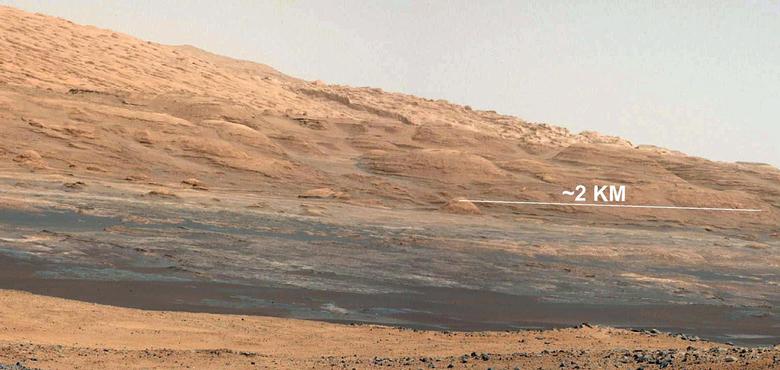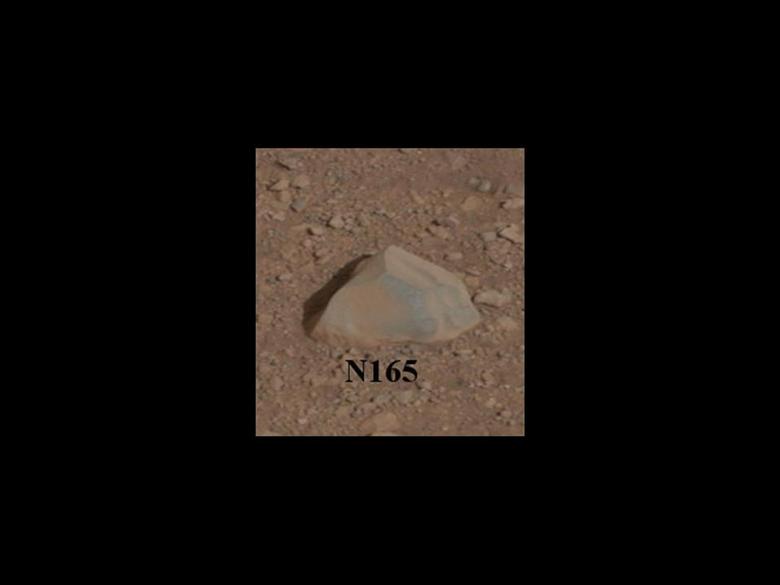|
[VIEWED 21892
TIMES]
|
SAVE! for ease of future access.
|
|
The postings in this thread span 3 pages, go to PAGE 1.
This page is only showing last 20 replies
|
|
|
bittertruth

Please log in to subscribe to bittertruth's postings.
Posted on 08-06-12 1:01
AM
Reply
[Subscribe]
|
Login in to Rate this Post:
0  ?
? 
|
| |
Scientists at Jet Propulsion Laboratory, the one in the front profiling MARs Curiosity Landing LIVE
Time: 10:31pm PST, Sunday August 5th, 2012

Rover got alive and active as soon as it landed the surface on the mars and this is the first ever image taken by the rover which made such a big (2000 pound) landing, downlinked to earthlings to see :D

Yayyy 
|
| |
|
|
The postings in this thread span 3 pages, go to PAGE 1.
This page is only showing last 20 replies
|
|
|
bittertruth

Please log in to subscribe to bittertruth's postings.
Posted on 08-09-12 10:32
AM [Snapshot: 1605]
Reply
[Subscribe]
|
Login in to Rate this Post:
0  ?
? 
|
| |
I agree with dharke bro's last sentence and I think that would work . :D
|
| |
|
|
Geology Tiger

Please log in to subscribe to Geology Tiger's postings.
Posted on 08-09-12 11:10
AM [Snapshot: 1631]
Reply
[Subscribe]
|
Login in to Rate this Post:
0  ?
? 
|
| |
I think the most challenging and important job for terraforming of Mars will be creating an artificial magnetosphere. There might be several ways to develop habitable atmosphere on Mars. But to prevent escaping of gases into space it requires strong magnetosphere. So the question is how they are going to create magnetosphere ? Perhaps by restarting the geological dynamo deep inside the core of Mars?
Last edited: 09-Aug-12 11:10 AM
|
| |
|
|
_____

Please log in to subscribe to _____'s postings.
Posted on 08-09-12 11:46
AM [Snapshot: 1662]
Reply
[Subscribe]
|
Login in to Rate this Post:
0  ?
? 
|
| |
In My story "Human Wrongs" a similar situation planet bleeding its atmosphere into the space is explained in plain english.However this may not be a 100% scientific explanation.Could be one of many reasons.
|
| |
|
|
Nepali_American

Please log in to subscribe to Nepali_American's postings.
Posted on 08-09-12 11:51
AM [Snapshot: 1668]
Reply
[Subscribe]
|
Login in to Rate this Post:
0  ?
? 
|
| |
Wait till the conspiracy theory nitwits come out of their caves...
|
| |
|
|
bittertruth

Please log in to subscribe to bittertruth's postings.
Posted on 08-09-12 12:11
PM [Snapshot: 1704]
Reply
[Subscribe]
|
Login in to Rate this Post:
0  ?
? 
|
| |
Gt bro, how about artificially created atmosphere inside chambers ultimately leading to domes structure. I know this is unrealistic but creating atmosphere there probably would take millions of years, temporarily domes are good choice to work and discover
|
| |
|
|
mno

Please log in to subscribe to mno's postings.
Posted on 08-09-12 3:07
PM [Snapshot: 1759]
Reply
[Subscribe]
|
Login in to Rate this Post:
0  ?
? 
|
| |
|
|
| |
|
|
atomic

Please log in to subscribe to atomic's postings.
Posted on 08-09-12 3:32
PM [Snapshot: 1785]
Reply
[Subscribe]
|
Login in to Rate this Post:
0  ?
? 
|
| |
These picture looks like from Utah or sudden part of Nevada. I'm just saying my fellows.
|
| |
|
|
bittertruth

Please log in to subscribe to bittertruth's postings.
Posted on 08-09-12 8:07
PM [Snapshot: 1874]
Reply
[Subscribe]
|
Login in to Rate this Post:
0  ?
? 
|
| |
yeap, almost earth like, :D That's what I was thinking too.. oh well, there was life once.. millions of years ago on MARS.. for sure :D
|
| |
|
|
bittertruth

Please log in to subscribe to bittertruth's postings.
Posted on 08-10-12 12:46
AM [Snapshot: 1951]
Reply
[Subscribe]
|
Login in to Rate this Post:
0  ?
? 
|
| |
This is the first 360-degree panorama in color of the Gale Crater landing site taken by NASA's Curiosity rover. The panorama was made from thumbnail versions of images taken by the Mast Camera.
Scientists will be taking a closer look at several splotches in the foreground that appear gray. These areas show the effects of the descent stage's rocket engines blasting the ground. What appeared as a dark strip of dunes in previous, black-and-white pictures from Curiosity can also be seen along the top of this mosaic, but the color images also reveal additional shades of reddish brown around the dunes, likely indicating different textures or materials.
The images were taken late Aug. 8 PDT (Aug. 9 EDT) by the 34-millimeter Mast Camera. This panorama mosaic was made of 130 images of 144 by 144 pixels each. Selected full frames from this panorama, which are 1,200 by 1,200 pixels each, are expected to be transmitted to Earth later. The images in this panorama were brightened in the processing. Mars only receives half the sunlight Earth does and this image was taken in the late Martian afternoon.
Image credit: NASA/JPL-Caltech/MSSS

Last edited: 10-Aug-12 12:48 AM
|
| |
|
|
rali145

Please log in to subscribe to rali145's postings.
Posted on 08-10-12 12:47
AM [Snapshot: 1954]
Reply
[Subscribe]
|
Login in to Rate this Post:
0  ?
? 
|
| |
/ 
|
| |
|
|
bittertruth

Please log in to subscribe to bittertruth's postings.
Posted on 08-10-12 2:07
AM [Snapshot: 1994]
Reply
[Subscribe]
|
Login in to Rate this Post:
0  ?
? 
|
| |
This full-resolution image shows part of the deck of NASA's Curiosity rover taken from one of the rover's Navigation cameras looking toward the back left of the rover.
On the left of this image, part of the rover's power supply is visible. To the right of the power supply can be seen the pointy low-gain antenna and side of the paddle-shaped high-gain antenna for communications directly to Earth. The rim of Gale Crater is the lighter colored band across the horizon. The effects of the descent stage's rocket engines blasting the ground can be seen on the right side of the image, next to the rover.
This full-resolution image is 1,024 by 1,024 pixels. The image was taken on Aug. 7 PDT (Aug. 8 EDT).
Image credit: NASA/JPL-Caltech

|
| |
|
|
bittertruth

Please log in to subscribe to bittertruth's postings.
Posted on 08-10-12 2:13
AM [Snapshot: 1996]
Reply
[Subscribe]
|
Login in to Rate this Post:
0  ?
? 
|
| |
If you guys are wondering how rover sends data(images) from that far to Earth, here is the answer :
Mars is rotating on its own axis so Mars often "turns its back" to Earth, taking the rover with it. The rover is turned out of the field of view of Earth and goes "dark", just like nighttime on Earth, when the sun goes out of the field of view of Earth at a certain location when the Earth turns its "back" to the sun. The orbiters can see Earth for about 2/3 of each orbit, or about 16 hours a day. They can send much more data direct-to-Earth than the rovers, not only because they can see Earth longer, but because they can operate their radio for much longer since their solar panels get light most of the time, and they have bigger antennas than the rovers.
src
|
| |
|
|
bittertruth

Please log in to subscribe to bittertruth's postings.
Posted on 08-10-12 2:20
AM [Snapshot: 2001]
Reply
[Subscribe]
|
Login in to Rate this Post:
0  ?
? 
|
| |
This animation shows how orbiters over Mars will monitor the landing of NASA's Curiosity rover. Curiosity will communicate with Earth via two of NASA's Mars orbiters, Mars Reconnaissance Orbiter and Odyssey. As the rover descends to the surface of Mars, it will send out two different types of data: basic radio-frequency tones that go directly to Earth (pink dashes) and more complex UHF radio data (blue circles). Odyssey will pick up the UHF signal and relay it immediately back to Earth (seen as a beam of small blue circles). Meanwhile, Mars Reconnaissance Orbiter will record the UHF data and play it back to Earth at a later time. Back on Earth, the rover's signals are picked up by large antenna dishes at NASA's Deep Space Network (DSN), which has three complexes in Goldstone, Calif., Madrid, Spain and Canberra, Australia. The DSN sends the information to Curiosity's mission control at NASA's Jet Propulsion Laboratory, Calif. As the rover descends to Mars, it will send out basic radio-frequency tones that go directly to Earth. NASA's Odyssey orbiter will then relay more complex UHF radio signals from the rover to Earth. NASA's Mars Reconnaissance Orbiter will fly over NASA's Curiosity (shown in pink) as the rover lands on the Red Planet. The video is slowed down as the orbiter approaches the landing site for better viewing. Mars Reconnaissance Orbiter will capture data during Curiosity's entry, descent and landing for later playback to Earth. Its High Resolution Imaging Science Experiment (HiRISE) camera will attempt to take an image of Curiosity as it descends to the surface (green). HiRISE is one of six instruments on NASA's Mars Reconnaissance Orbiter.
|
| |
|
|
bittertruth

Please log in to subscribe to bittertruth's postings.
Posted on 08-12-12 11:25
AM [Snapshot: 2160]
Reply
[Subscribe]
|
Login in to Rate this Post:
0  ?
? 
|
| |
I wonder what's happening to 'Curiosity',
it hasn't sent a single snap since 2 days.
I hope all is well :D 
|
| |
|
|
bittertruth

Please log in to subscribe to bittertruth's postings.
Posted on 08-12-12 10:11
PM [Snapshot: 2294]
Reply
[Subscribe]
|
Login in to Rate this Post:
0  ?
? 
|
| |
Update: Curiosity is in 'brain transplant' phase meaning software upgrades and will go through Aug 13.
The software will enable Curiosity to roam around according to mar's surface.
Being able to beam updates 350 million miles far away to Mars via orbiters and satellites should itself be taken as quiet an achievement for human kind 
|
| |
|
|
bittertruth

Please log in to subscribe to bittertruth's postings.
Posted on 08-13-12 9:45
PM [Snapshot: 2441]
Reply
[Subscribe]
|
Login in to Rate this Post:
0  ?
? 
|
| |
|
|
| |
|
|
Geology Tiger

Please log in to subscribe to Geology Tiger's postings.
Posted on 08-17-12 10:00
PM [Snapshot: 2637]
Reply
[Subscribe]
|
Login in to Rate this Post:
0  ?
? 
|
| |
Image and summary credit: NASA/JPL-Caltech/MSSS

The Promised Land
This image (cut out from a mosaic) shows the view from the landing site of NASA's Curiosity rover toward the lower reaches of Mount Sharp, where Curiosity is likely to begin its ascent through hundreds of feet (meters) of layered deposits. The lower several hundred feet (meters) show evidence of bearing hydrated minerals, based on orbiter observations. The terrain Curiosity will explore is marked by hills, buttes, mesas and canyons on the scale of one-to-three story buildings, very much like the Four Corners region of the western United States.
A scale bar indicates a distance of 1.2 miles (2 kilometers).
Curiosity's 34-millimeter Mast Camera acquired this high-resolution image on Aug. 8, 2012 PDT (Aug. 9 EDT).
This image shows the colors modified as if the scene were transported to Earth and illuminated by terrestrial sunlight. This processing, called "white balancing," is useful to scientists for recognizing and distinguishing rocks by color in more familiar lighting.
http://www.nasa.gov/mission_pages/msl/multimedia/pia16073.html

Curiosity's First Rock Star, Up-Close
This close-up image shows the first target NASA's Curiosity rover aims to zap with its Chemistry and Camera (ChemCam) instrument. ChemCam will be firing a laser at this rock, provisionally named N165, and analyzing the glowing, ionized gas, called plasma, that the laser excites. The instrument will analyze that spark with a telescope and identify the chemical elements in the target.
|
| |
|
|
shivashrestha

Please log in to subscribe to shivashrestha's postings.
Posted on 08-18-12 2:36
AM [Snapshot: 2783]
Reply
[Subscribe]
|
Login in to Rate this Post:
0  ?
? 
|
| |
Kasto desert nai desert, ani geology brother timilay khicheko paila ko photo haru ni yestai ta thiyo ni california ko desert haru, i mean sand dunes.
|
| |
|
|
bittertruth

Please log in to subscribe to bittertruth's postings.
Posted on 09-16-12 11:10
AM [Snapshot: 2988]
Reply
[Subscribe]
|
Login in to Rate this Post:
0  ?
? 
|
| |
Strange Mystery Spheres on Mars Baffle Scientists
By Tariq Malik | SPACE.com – Sat, Sep 15, 2012
A strange picture of odd, spherical rock formations on Mars from NASA's Opportunity rover has scientists scratching their heads over what exactly they're looking at.
The new Mars photo by Opportunity shows a close-up of a rock outcrop called Kirkwood covered in blister-like bumps that mission scientists can't yet explain. At first blush, the formations appear similar to so-called Martian "blueberries" — iron-rich spherical formations first seen by Opportunity in 2004 — but they actually differ in several key ways, scientist said.
"This is one of the most extraordinary pictures from the whole mission," said rover mission principal investigator Steve Squyres of Cornell University in Ithaca, N.Y., in a statement. "Kirkwood is chock full of a dense accumulation of these small spherical objects. Of course, we immediately thought of the blueberries, but this is something different. We never have seen such a dense accumulation of spherules in a rock outcrop on Mars."
The new photo by Opportunity is actually a mosaic of four images taken by a microscope-like imager on its robotic arm, and then stitched together like puzzle pieces by scientists on Earth.
src: http://news.yahoo.com/strange-mystery-spheres-mars-baffle-scientists-123054357.html
|
| |
|
|
Curiosity

Please log in to subscribe to Curiosity's postings.
Posted on 09-16-12 9:27
PM [Snapshot: 3190]
Reply
[Subscribe]
|
Login in to Rate this Post:
0  ?
? 
|
| |
|
|
| |
